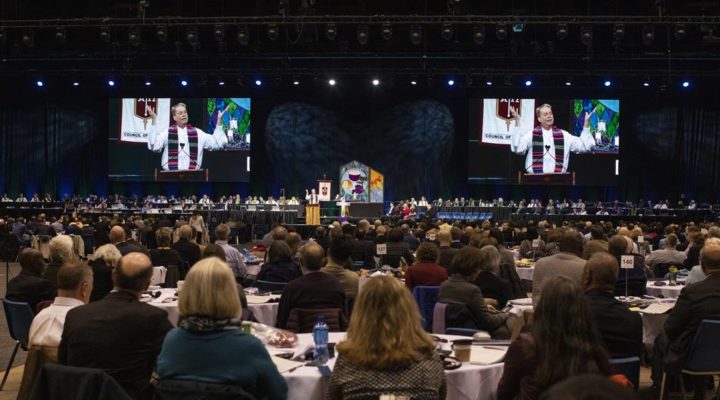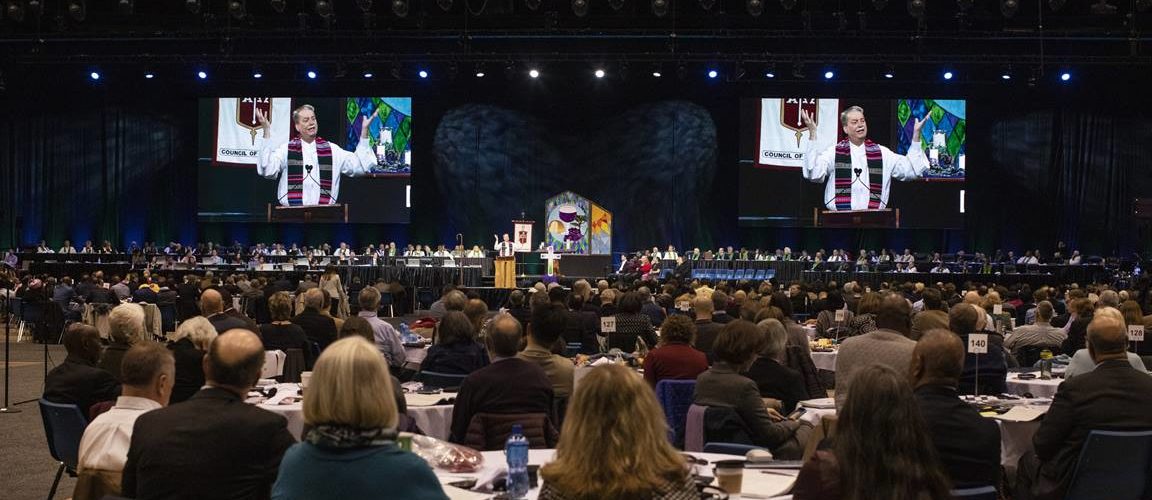Prospects for The United Methodist Church’s twice-delayed General Conference — the only body that can make binding decisions for the entire 12-million-member worldwide denomination — dimmed considerably with the announcement of a new, more infectious variant of coronavirus now labeled “Omicron.”
Despite President Joe Biden’s reassurance that Omicron’s discovery is “a cause for concern, not a cause for panic,” the variant poses a “very high” risk globally, according to a Nov. 29 article in the New York Times. Many questions about Omicron remain for scientists to unravel, but even this early the variant’s discovery may well be the tipping point for the UMC, given a set of criteria established in mid-November by General Conference organizers.
The General Commission on the General Conference met online Nov. 18 to consider whether to proceed with the global legislative assembly. The worldwide conclave, scheduled originally for May 2020, has been postponed twice because of the coronavirus pandemic. The meeting currently is slated for Aug. 29 through Sept. 6, 2022, in Minneapolis.
General Conference organizers outlined the following criteria for holding the legislative assembly, according to a Nov. 19 article by Heather Hahn of UM News:
- Reasonable threshold for delegate participation (overall and by global region).
- Health and safety of General Conference delegates, staff, volunteers and guests.
- Inclusion.
- Anti-racism.
- Integrity.
- Credibility.
- Recognition of The United Methodist Church’s mission to make disciples of Jesus Christ for the transformation of the world.
- Owning the responsibility of the commission to set the time and place of General Conference.
Most United Methodists view the proposed 2022 session as pivotal to the UMC’s future because legislation has been submitted to split the denomination over the issue of LGBTQ acceptance.
A proposal known as the Protocol of Reconciliation & Grace Through Separation was negotiated in late 2019 by an independent ad hoc group made up of representatives from various pro- and anti-LGBTQ factions in the church. The Protocol, as it’s generally known, has been heavily promoted by a traditionalist organization, the Wesleyan Covenant Association, which proposes to start a new, stricter denomination it is calling the Global Methodist Church.
Unfortunately, pandemic-caused delays have stressed the denomination’s organization and process nearly to the breaking point.
Other factions, such as Reconciling Ministries Network, also favor the Protocol because it is seen as an opportunity finally to rid the UMC of its condemnation of homosexuality and bans on same-sex marriage and LGBTQ clergy. However, Reconciling Ministries Network also favors an alternative proposal, the Christmas Covenant, that would maintain the UMC’s unity while providing for greater regional autonomy, allowing U.S. and international regions to decide on LGBTQ acceptance for themselves.
Unfortunately, pandemic-caused delays have stressed the denomination’s organization and process nearly to the breaking point. The nature of General Conference’s composition and its legislative process, both prescribed by the UMC’s laws known as the Book of Discipline, hamper adaptations that might help achieve the values set forth by the assembly’s organizers. The aftermath of the last General Conference held in 2019 illustrates the frustration facing United Methodists if another coronavirus delay happens.
African delegates played a crucial role at the special called 2019 General Conference, which was expected to enact a form of the denomination that would have allowed a kind of “live-and-let-live” local option on LGBTQ acceptance. Instead, traditionalist forces mustered African delegates to vote against the legislation so that the UMC’s strictures against same-sex practice were tightened by a margin of fewer than 60 votes out of more than 800 delegates.
The 2019 session also was tainted by allegations of voting fraud. A task force set up to investigate the allegations found “credible objective evidence” of four ineligible people casting votes using the credentials of delegates who were not present. General Conference organizers attempted to invalidate one ballot because of the investigation’s results. However, the UMC’s “high court,” the Judicial Council, ruled in April this year that it was unconstitutional for the General Conference Commission to void that ballot. Organizers have sent other concerns stemming from the 2019 General Conference to the Judicial Council for determination, but thus far the Council has declined to rule, saying only General Conference has jurisdiction over the legislative process.
The prospect of yet another delay of General Conference sets United Methodist leaders on edge.
Thus, the prospect of yet another delay of General Conference sets United Methodist leaders on edge.
Several countries — including Israel, Morocco and Japan — already have imposed bans on foreign travelers, especially from southern Africa where Omicron was discovered. Omicron cases have been reported in Portugal and Scotland, attesting to its perceived higher rate of infection. The top U.S. infectious disease expert, Anthony Fauci, has said he thinks Omicron already has entered the United States, expecting to find U.S. evidence of the variant in the next two weeks.
These developments bode ill for the United Methodist General Conference, which will be comprised of 862 voting delegates — 55.9% from the United States, 32% from Africa, 6% from the Philippines, 4.6% from Europe and the rest from other churches with close ties to UMC. The number of delegates from each annual conference is determined by the number of members in its region. The delegates are divided into half clergy and half laypeople.
Before Omicron was discovered — and despite improper voting at the 2019 conclave — General Conference organizers considered the prospect of a “hybrid” meeting using online technology that has become ubiquitous during the pandemic. However, a technology team reported several obstacles to such a plan: multiple time zones between delegates; unequal and unreliable internet availability, especially in African countries; and difficulties in ensuring voting integrity. The commission’s vice chair, Mujinga Kashala of Congo, confirmed through an interpreter that she has missed executive committee meetings because of poor internet connectivity.
Conference organizers said they were especially concerned about handling the global assembly’s legislative process, during which delegates review thousands of petitions and decide which to forward for consideration by the full body. The next session is expected to have 14 legislative committees on various topics ranging from theology to clergy matters to social concerns, including LGBTQ acceptance.
After the Nov. 18 session, organizers speculated that it might take more than one meeting to decide whether to hold the 2022 General Conference. Depending on what scientists learn in the next few weeks, the Omicron coronavirus variant appears likely to have sped up that timeline, and the prospects aren’t encouraging for United Methodists to decide on breaking up next year.
Related articles:
United Methodists chafe at their wilderness wandering
Analysts hope to help congregations understand the options with potential United Methodist split
Now there appear to be three paths for once-united Methodists
Top-down schism plans ignore local United Methodist churches’ new reality
A primer for non-Methodists on the Methodist ties that bind


